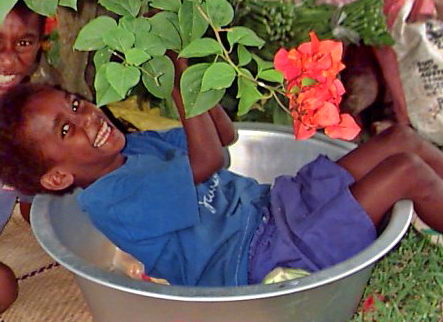Kind cruising - hospitality when cruising the remote islands of Vanuatu

Port Vila - Gateway to Vanuatu
When you are in Vanuatu, in Port Vila, and you walk down the street, the people who live there think you have as much right to be in downtown Port Vila as they do. If, that is, they think about you at all. In downtown Port Vila everyone is busy with the jobs and responsibilities that drive them from one activity, meeting and conversation to another. You walk amid a mixture of people and ideas from all over the world. Port Vila is a modern invention laminated on the island of Efate. It is the beach-head of the Island nation. It is a Port of Entry in every sense of the word and vastly different from the villages you will discover on your cruising expeditions in the islands.
in Rural Vanuatu Villages You are the guest, they are the hosts
When you are in the out islands, it is entirely different. You are of immense interest to everyone in the village. The people of the village have lived right there, generation after generation, from birth till death, for thousands of years. In the more rural areas many of the people have not ventured very far from their own village and gardens. No matter how "wild" it looks, you walk through a cultural landscape reflecting the actions, non-actions and interactions of everyone and all their ancestors since time began. Everything the people see (and they don't have TV) has been around them so long they don't notice it except when they have to. But you are something entirely different. Alien. Exciting. Most of the villagers will have met and tested tourists over the years. They think they know who and what you are and have developed strategies for coping with tourists. Whatever their thoughts, whatever their aspirations, always keep in mind that you are their guest in their intimate domain.
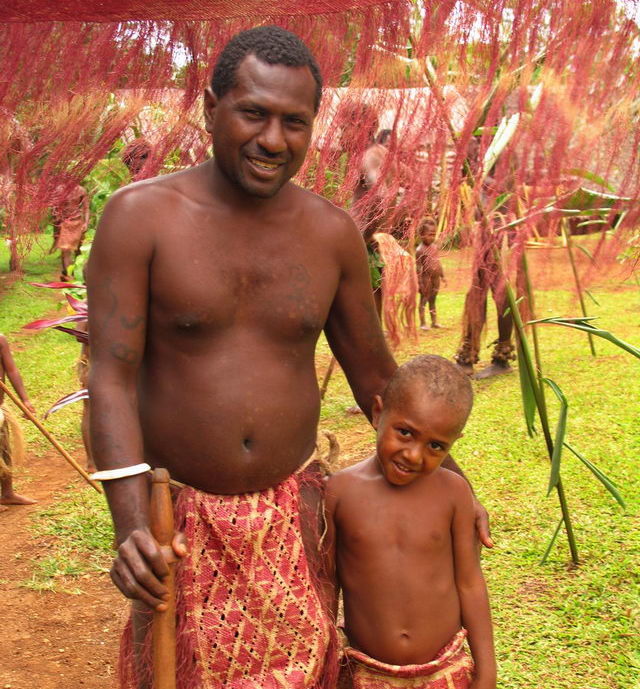
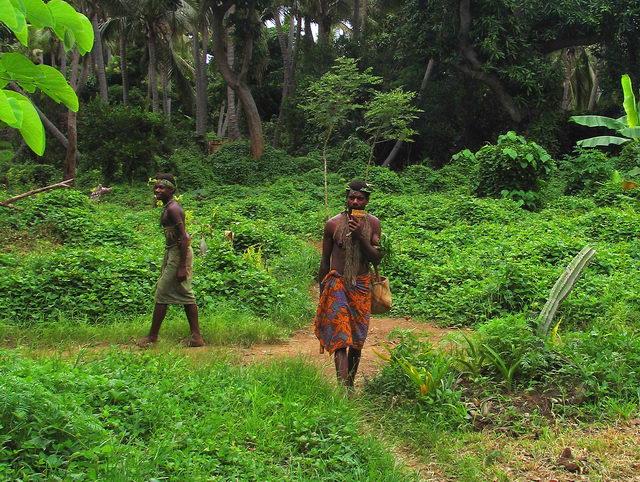
Ancient Cultures
When you enter the village, you enter the intimacy of their society. You might, in your ignorance, walk into the women's toilet, thinking it is a lovely part of the forest. You might, in your ignorance, do or say something very rude. Like thinking or acting like you are the host and they are the guest. You can play host on your yacht, but when you are anchored in their bay, your yacht is their guest and it's best not to forget this.
Hospitality is a very important feature of the Ni-Vanuatu society. Hospitality is a sensitive and delicate social relationship with myriad rules that you can't imagine let alone achieve. The men are very grade conscious and they work hard to move up the ladder of hospitality until they are considered capable of being the most hospitable of all. They earn statues along the way; of ancestors carved out of fern trees; of ancestors carved into giant wooden drums; of ancestors carved (for the higher ranks in hospitality) out of stone.
Giving
Big men give more gifts, of food or money, than those below them in rank. Gift giving and gift receiving is complicated and important. To give a gift to someone in a village has all kinds of associations attached to it - so you, as a guest, knowing nothing of the intricate and difficult social relationships in the village, should not give gifts to people. You could, once you scope things out, give a gift to the village (for example to the school) but even this is more complex than you might suspect.
Trading is different. Trading is fine so long as both parties feel the trade is an equal one. Beware of anyone who asks for gifts. Only deal with those who would trade with you. You can gift the Chief because this is respect. You trade with others whom are considered of equal rank or below you.
If someone considers you of superior rank and gives you a gift, do not assume that you are now the host or that they desire more than your approval and thanks. And maybe one day a small favour.
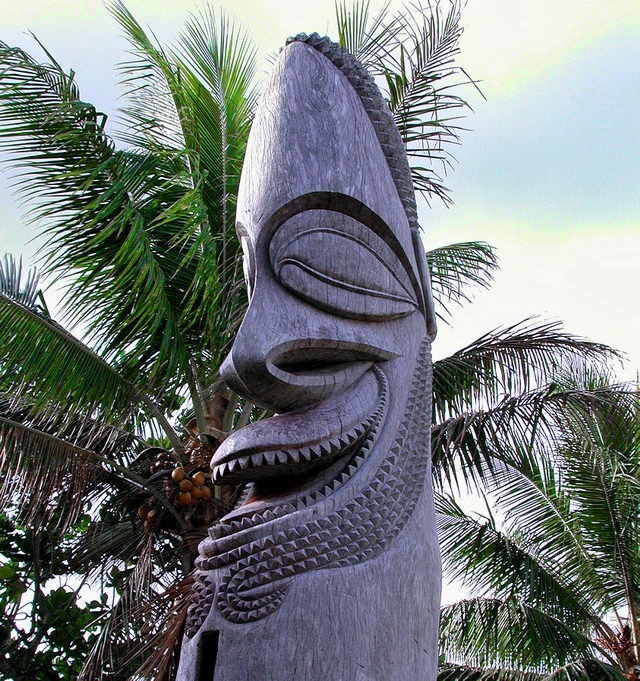
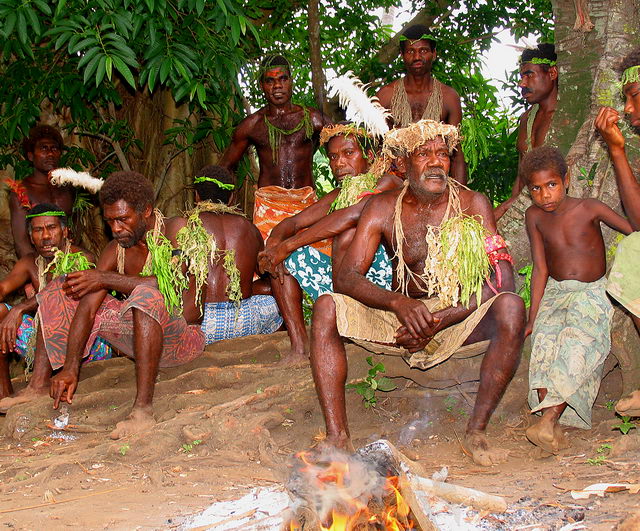
respect
Wherever you go and whatever you do, the Chief of the village is your host. You go to see him when you arrive to show proper respect to his hospitality. You are there on his sufferance; he is not there at yours. So think about hospitality as you walk on the beach or as you dive into the sea off your yacht. And go pay your respects to the Chief.
Unlike Custom in Fiji or New Caledonia, Chiefs in Vanuatu do not expect you to bring a gift. Go with respect, that's what he really wants you to bring. You can bring a small gift, preferably food, but not so much that he could not return your gift with something of equal value. And whatever you bring you might be expected to share with him. DO NOT BRING ALCOHOL ASHORE (Talk about causing trouble).
Enjoy
When you walk into their village, when you come into their lives, you will find young people coming around you who have never seen a white person before. They will want to touch you. To feel your hair and your skin with their fingertips. Sometimes when you are talking, the children sneak up from behind, reach out and touch your hair and then run off laughing and shy.
Everyone is so kind and friendly you will be amazed. But they are also rigidly woven into social networks and forms of behavior. If you violate these forms, you wound them.
You are also a guest in their midst, a stranger of great wealth and knowledge. Your vessel speaks to them as does your face and the faces of those who come with you.

Try a Smile get one back
They take half, if not all, of what you say to them from your body language; from the way you hold your mouth and your eyes; the way you tense the muscles in your face.
Watch them mimic your face and you will realize that they are reflecting your own feelings with wonderful skill. They understand what you say with your body far better than what comes out of your mouth.
Watch them and you can see them doing it. They mimic your face exactly. Try a smile - get one back. Try a frown - and see it reflected - like a mirror around you but a funny mirror that puts your face onto the bodies of little children and teenage girls and young men wearing small nambas in the jungle mountains of southern Malekula.
Keraoke of the spirit
You are an emissary of your people in a strange and beautiful place, amid another kind of people in another kind of culture, but a way of life that somewhere, down deep inside of us, we all identify with. Pay attention to your own inner feelings because everyone in the village is seeing and reflecting these feelings.
If your face shows a mixture of respect and pleasure and harmony, you will resonate with them in the best way possible. And you will enjoy the respect, pleasure and harmony you create with them.
Like Karaoke of the spirit, everyone in the village sings along. And dances. And dresses up. And celebrates.
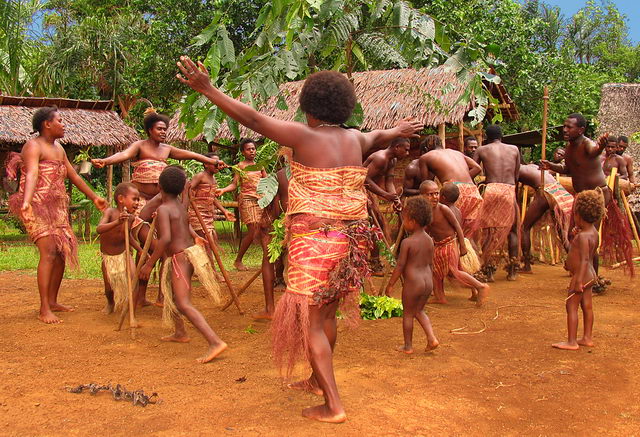
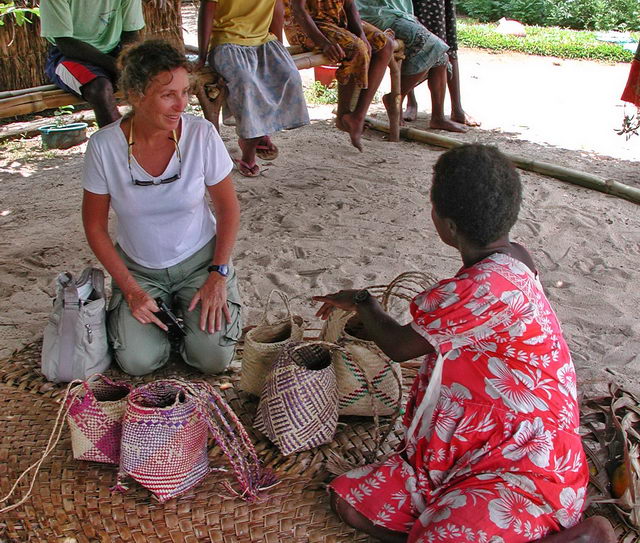
pay it on
If you want to contribute to the village without creating disharmony, do something that benefits the majority. This depends on the individual village needs and is something you will have to scope out. You might offer to help fix the village water supply, or help repair the boat or outboard motor used to service the village (particularly if you can teach some of the men the diagnostic skills used to troubleshoot and repair outboards), or donate some antibiotics or other medicines in short supply to the clinic, or donate some books to the school, fix the women's groups' sewing machine. The rule of thumb is, "will my gift empower people or create dependency?"
One way Yachties can redistribute wealth without creating dependency is by offering to purchase carvings from the men or other handicrafts produced by the women such as baskets or mats. This may encourage the young men to take up carving as a way to earn some cash and help maintain traditional skills. Women often weave baskets and mats for their families. You might suggest you would be interested in buying some if they get a chance to weave some extra ones. Again, in this way, traditional arts are maintained and the villagers have access to cash.
Sustainable
There are interesting treks through wilderness areas on all of the islands and some exciting dive spots. To visit them you need to ask permission of the chief of the village. He will assign a guide to show you the local waterfall or accompany you to the top of a live volcano, or walk through a forest of giant ancient trees or maybe explore a taboo ancestorial site with cave paintings. Settle on a price before you go and pay the chief when you return.
More and more villages charge visitors to see their custom dancing, or visit their cave or waterfall. Some people on yachts get upset by this, yet charging fees to tourist attractions - and to beaches and public parks - is common in every country of the world. It is one of the very few ways villagers can earn money and is ecologically much better than selling their forests or their marine resources.


For more on hospitality and culture
Get the comprehensive and accurate, easy to use, interactive Rocket Cruising Guide to Vanuatu for lots more information about making your Vanuatu cruise the experience of a lifetime.
